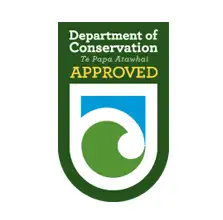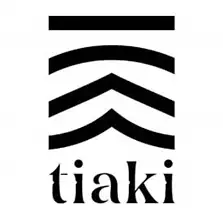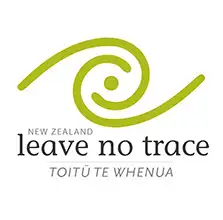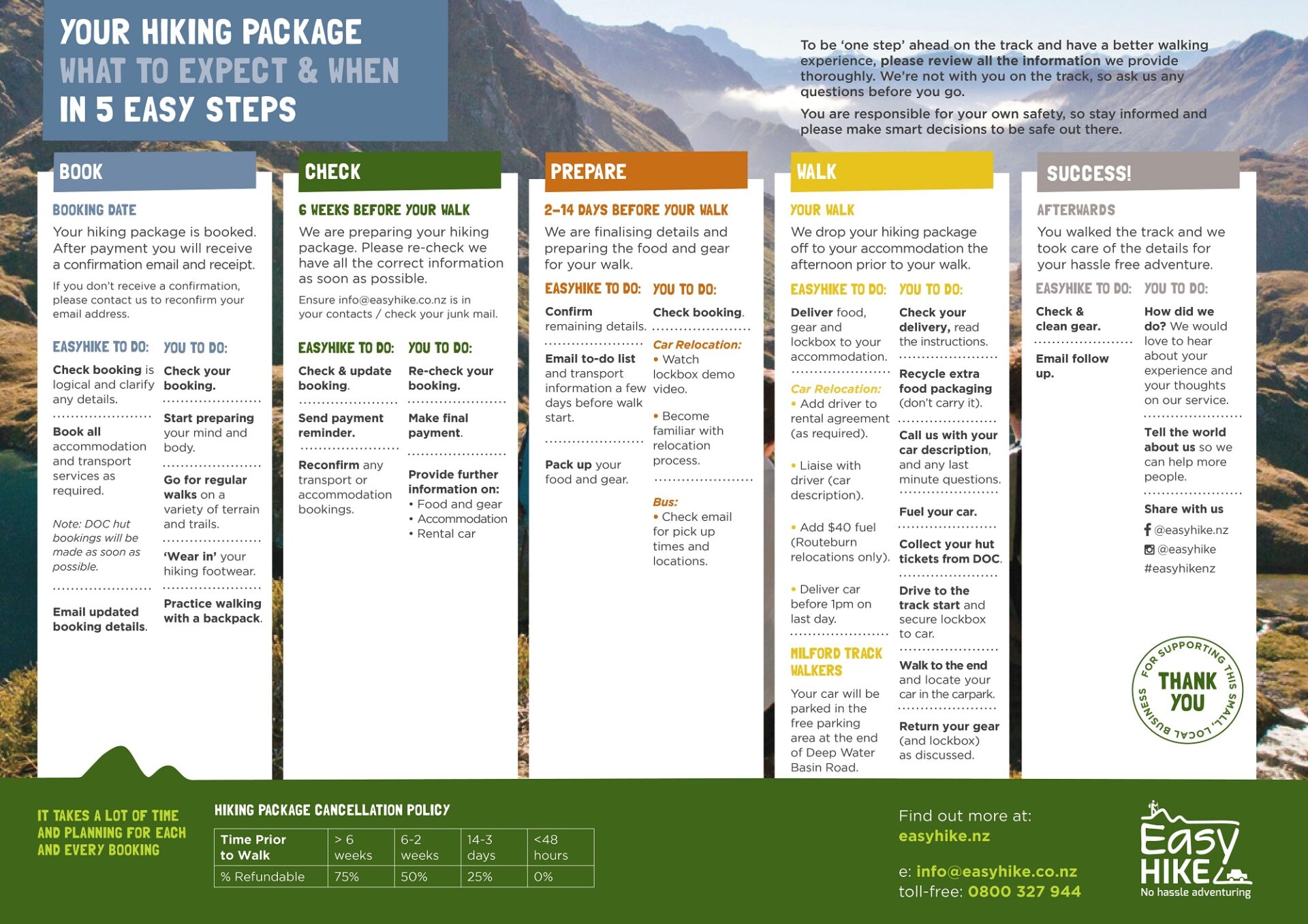Hike Planner
Be one step ahead with our hike planner & have a fantastic hike.
LET’S GET YOU HIKING WITH EASE
Preparing for your hike is everything. We’re not just talking about having your logistics sorted (that’s our job!), but preparing your body, mind, and expectations (your job!) is just as important. The more prepared you are, the more you’ll enjoy your hike so, have a read of our hike planner information below and let us know if we can help you further.
Prepare your mind and body
ATTITUDE IS EVERYTHING!
Having a positive mindset before your hike is super important. Some things will be outside of your control (hello Fiordland weather!), but you CAN control your attitude.
A bit of rain? No problem – embrace it! Check out the roaring waterfalls that pop up, enjoy that impromptu wash, and nature at its most powerful. That alpine pass a bit harder than you expected? Imagine the sense of accomplishment you’ll feel when you reach the top, and the tasty reward you’ve been saving for the occasion!
If you can focus on the positives of any situation, you’ll be so much happier for it, and chances are, there’ll be the bonus of a few laughs along the way.
You don’t have to be an athlete or alpine explorer to complete a Great Walk, but having a good level of fitness, and the right footwear will mean your hike is a much happier experience.
Check out these blogs for further information:
Visit DOC to collect hut tickets
It is recommended you to visit the local Department of Conservation (DOC) Visitor Centre to be most prepared.
The Visitor Centres have great information about the area, that all-important weather report and latest track information. We encourage you to visit at least a couple of days before your walk. Though we understand it might not be possible.
If your travel arrangements prevent this, let us know and we will provide further information.
Pre Hike To-Do List - Car Relocation
- Provide us with your car description (Make, Model, Colour) and licence plate number. If it is a rental, we also need the rental company AND booking reference (so that we can add our driver to your rental agreement assuring the driver is insured while driving).
- Test your lockbox (with your car and key).
- Check your food and gear, and rearrange items if you wish.
- Check the weather and be prepared.
- Visit the local DOC office and collect your hut tickets.
- Fuel your car (fill ‘er up please).
- Drive to the start, park, and secure your key.
- Ensure your lights are off (we do not want a flat battery) and all car doors are locked.
Pre Hike To-Do List - Bus Transport
- Check your food and gear.
- Check the weather and be prepared.
- Check your transport details and arrive 15 minutes early.
- Visit the local DOC office for the all important latest weather report and track conditions.
Post Hike To-Do List
- Drop off your borrowed gear to the Alpine Centre, 2 Sandy Brown Rd, Te Anau.
- If doing a car relocation, please drop off your lockbox:
- Te Anau. RD Petroleum: 7 Town Centre, Te Anau
- Queenstown. Mobil petrol station: 1 McBride Street, Frankton, Queenstown.
- Enjoy a well-earned, refreshing beverage (perhaps even soak in a bath/hot tub!).
- Tell your friends and family about our service!
- Share your hiking photos with us #easyhikenz @easyhike.nz.
- Start planning your next hike. 🙂
Collection point
We have partnered with the Alpine Centre, situated at 2 Sandy Brown Rd, in Te Anau. Unless you have opted for a gear delivery and/or gear pick up, this is where you will collect your gear pre-hike, and drop off your gear post-hike.
Inside is a cupboard which we will use to leave your gear/food inside. The code to access the cupboard is 369.
Your hiking package – what to expect and when – in 5 easy steps
WE’LL ARRANGE YOUR TRANSPORT
Over to you – Catch the bus, or have us relocate your car (recommended).
Choosing car relocation means you have the flexibility to start and finish the track when it suits you and a fresh pair of clothes and snacks waiting. We liaise with your rental car agency to add our driver to your agreement.
If self-driving isn’t an option for you, take the bus. With regular departures/drop-offs from central locations, you turn up at the right time and right place and go.
Please advise your transport preference at least 6 weeks prior to your hike. Of course we take care of your Milford and Kepler Track water taxi arrangments as well.
Bus Information
Bus Stops:
To start the track, the bus leaves from central Queenstown, Queenstown Airport, and the DOC Fiordland Visitor Centre, Te Anau. You will need to walk or catch a taxi to meet the bus. It will drop you back to these locations as well.
Luggage:
If you are staying at the same hotel before and after your walk, they will likely store your luggage for you. If not, you may need to transfer your luggage.
Extra factors to consider:
- Flexibility. If you are short on time or want to take your time along the way, catching the bus can be a hassle.
- Sightseeing. Would you like to stop along the way and maybe visit Paradise or Milford/Doubtful Sound?
Travelling Times:
Queenstown to Te Anau: 2.5 hours
Milford Sound to Queenstown: 4.5 – 5 hours
Queenstown to the Divide (Routeburn Track): 3.5 – 4 hours
Routeburn Shelter to Queenstown: 1.5 hours
Car Relocation Information
All the information about our car relocations is found here: www.easyhike.co.nz/car
You drive to the start of the track, we move your car to the end while you are walking. You are unlikely to meet us at the track.
We provide a lockbox for you to secure your car key when you park at the start of the track. You will need to pick it up from one of our locations. It includes an instruction card and the combination to open the lockbox.
Rental cars – we will need:
– Your booking details (as soon as you make a booking with the rental company), your booking will show as TBA until we receive it. We need the rental company and booking reference. This allows us to add our driver to your rental agreement.
and
– Your car description (once you’ve collected the vehicle). We need the Make, Model, Colour, and most importantly, the licence plate.
Please call us with any questions, but don’t leave this to the last minute!
Step by Step Process:
- Ensure your car is full of fuel before starting your walk.
- Park your car, place the lockbox on the car, and lock your car.
- Secure your key inside using the combination provided with the lockbox.
- Our driver will pick up your car, drive it to your finish point, and leave your key in the lockbox.
- Locate your car and access your car key with the same combination.
- Enjoy the fresh clothes, drinks, and your favourite snacks you left in the car before hiking!
Note: Drop off the lockbox as you pass Queenstown or Te Anau.
Water Taxi Departure Times
Milford Water Taxi:
Departs Te Anau Downs for Glade Wharf at 11.30am or 2pm. Duration: 1 hour.
Departs Sandfly Point for Milford regularly between 12pm and 4.30pm as required. Duration: 10 minutes.
Kepler Water Taxi:
Departs Te Anau for Brod Bay at 8.30am, 9.30am and 10.30am daily. Duration: 10 minutes.
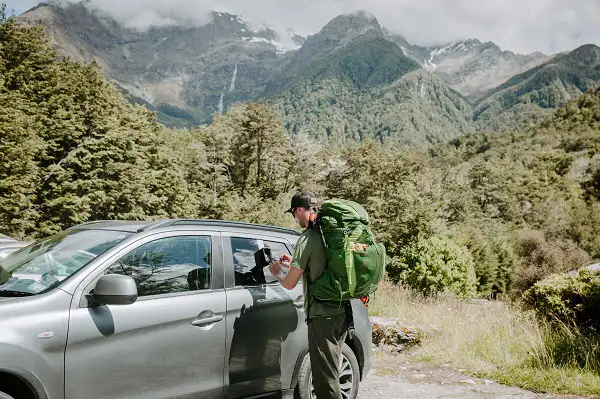
Want to know what happens and when for our car relocations?
Check out our 5 Step Process Hike Planner.
and WE WILL PACK YOUR FOOD
Food is such an important part of your hike.
Knowing there’s a hot cup of something or a yummy treat at the end of the day could be just what you need to spur you on through the last few km’s, and our food package will provide you with just that!
Lightweight, tasty, nutritious, and tailored just for your tastebuds, you definitely won’t go hungry with loads of snacks and easy-to-prepare meals we pack for you.
We also balance variety with packaging, simplicity, locally sourced, and planet-friendly.
MENU SELECTION
Our options cater to the most preferred diets: No diet requirements, vegetarian, and gluten free. If you are dairy free or vegan, please let us know, we have a menu designed for you.
Your hike duration will guide the quantity of the food we provide, including 3 meals a day (even dessert!), plus snacks and extras for contingency.
Please select your menu at least 6 weeks before your walk. We do our best to accommodate allergies and diet preferences, but if you have a particular allergy or dietary need, then please double check the packaging before eating.
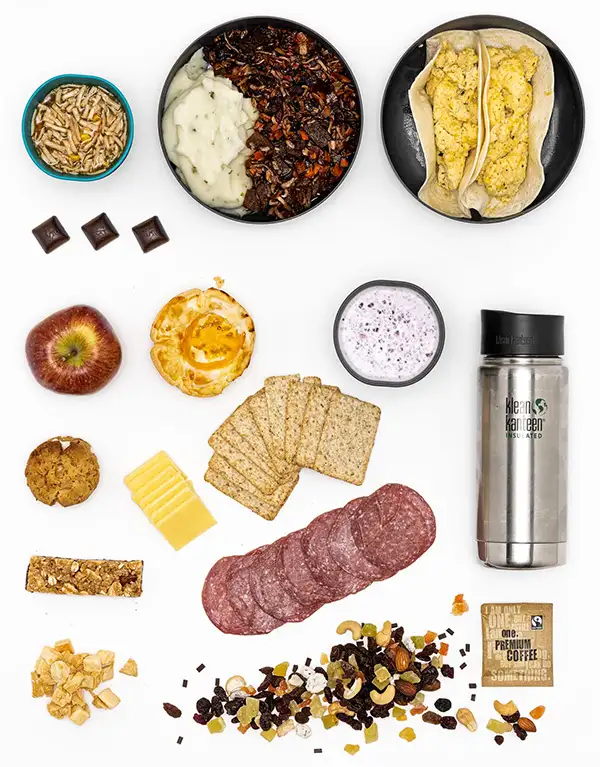
WE’LL LIGHTEN YOUR LOAD AND PACK YOUR BAG
The key to a safe and enjoyable hike is having a lighter pack and the right gear.
We’ve put a lot of thought into every item we provide to ensure you’ll have the best experience possible without the price tag of buying new.
Our gear is lightweight, warm, and practical. Our team of born-and-bred kiwis has grown up in the outdoors (including the youngest member, and she’s only 4!), so we’ve picked the gear we use because we know it works out there.
YOUR PACKING LIST
Packing for a hiking adventure can be tricky, especially if it’s your first time, or don’t know what to expect.
There’s a fine line between taking too much and not enough. The weather changes very quickly, and you need to be ready for all conditions – rain, snow, and shine!
We’ve taken the guesswork out of packing and put together a complete guide of what to take on your Great Walk.
We can deliver your hire gear the afternoon before you go, so you can try it on, and adjust in plenty of time.
If you have a premium package with us or a premium (or essential) gear hire, our packing list has an asterisk next to all the items provided.
You can download our packing list below.
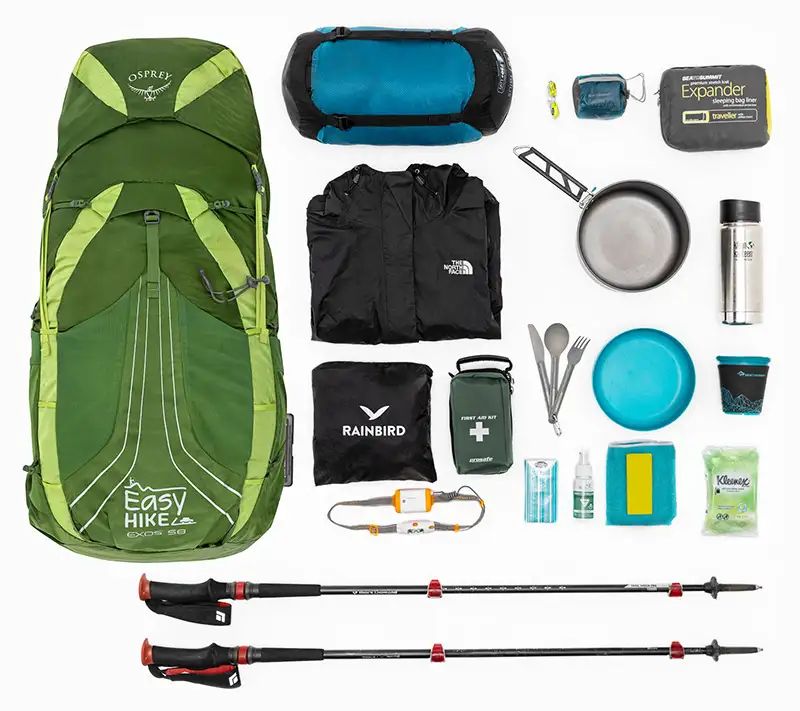
For those on our premium packages, we would need to confirm your sizing for the rain jacket and rain pants.
For those on our easyhike packages, please confirm your sizing for the rain jacket.
Please see below a New Zealand sizing chart. Please advise or confirm your size (and everyone in your group if travelling together) by clicking on the link below.
Hike Planner – WHAT TO EXPECT ALONG THE WAY
Great Walk Brochure Links
Great Walk DOC Huts
The huts along the track have a communal area and bunk rooms. Each bed has a plastic-covered mattress (no pillow) and a hook/space for your gear. When the huts are full, bunk rooms can be crowded. While there is no electricity, there are often solar lights in the communal areas but not in the bunk rooms. You will need a head torch (included in your equipment).
These Great Walk huts have flush toilets and usually loo paper, plus hand sanitizer. Some have an area where you can freshen up, so perhaps take a small travel towel. Tip: Heat some water for a hot facecloth in the morning – the best way to start the day!
There are gas stovetops in the hut kitchen for cooking food and boiling water. Most of the food we provide simply requires boiling water to prepare (quick and easy meals!). We’ve also included a kitchen tidy kit to help with your dishes.
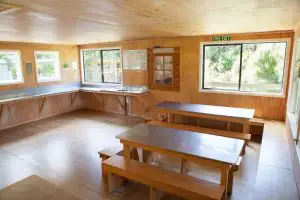
Hut Tips and Etiquette
You may like to arrive at the hut early so you have time to relax and enjoy your surroundings.
The sooner you arrive, the sooner you can choose your bed for the night. Be sure to layout your sleeping bag so other people know that space is taken. It is also quite nice to freshen up and square away your belongings for the evening. Perhaps even prepare your pack and clothing for the next day. This way, you won’t be rustling in your pack late at night or early in the morning while others are trying to sleep.
Always be considerate of others and keep your belongings tidy.
Use your spare time to relax, take a short walk, read a book, play cards, or chat with your fellow hikers. Daylight hours can be rather long during summer – the longest day is 23 December, and it is daylight from 5am till 10pm (approx).
Further information from the DOC Conservation Blog: Six ways you can be the best hut guest.
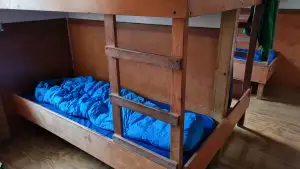
Wet and Dirty Gear
Boots aren’t allowed in the huts. So, consider taking some light footwear like slip-on sandals to wear inside. Remember to consider the benefit of carrying them – everything in your pack adds up!
If you have wet gear, the chances are others will too, so drying space will be minimal. While it is possible, don’t count on drying your clothing by the fire.
If your clothes aren’t too wet, consider continuing to wear them and let your body heat do the drying.
Taking too much or too little clothing is a balancing act. Take at least two sets of socks and thermal/merino underclothes, and ensure you have a dry set to put on each night.
Hut Wardens
Each night the DOC hut warden will do a talk about the track and weather the next day. Usually, they also include information about the local flora and fauna and other points of interest. They are very approachable if you have any questions. They are also there to assist in case of an emergency.
Water
The huts have cold running water, and while it may fine to drink, please take note of any DOC instructions/signs about boiling it (due to unknown chances of bugs).
It’s the same along the track. Take notice of any DOC signs and if you collect water for drinking, consider boiling it first. If you wish to collect water along the way, choose flowing streams over stagnant tarns.
It is essential to take a drink bottle to use during the day.
Cooking
Cooking in the huts
There are gas stove tops in the hut kitchen for you to use. Generally (due to your food package and most options being dehydrated meals) you only need to heat water to cook with and also to wash your dishes. You have a kitchen tidy kit to help with your dishes.
Cooking dehydrated meals
With dehydrated meals, in short, you will shake the meal pouch loose a bit while you boil water, then you will add water to the meal pouch up to the recommended amount. Once the water is added, you need to stir very very well to ensure all parts of the meal get water through it. Then you let it sit for at least 10 minutes, if you want to do 15 minutes, it won’t hurt, instead it will allow for the flavours to come back together and be activated. Once ready, you can either eat straight from the meal pouch, or you can pour it onto your plate.
We provide you with some salt and pepper if you need to enhance the taste, if you feel it needs it.
HOT TIPS
Mix thoroughly – the main mistake hikers make is not mixing their meals properly. Once you have added the correct amount of water, stir it thoroughly, meaning get your spoon to the bottom of the meal pouch and into the corners of the bag. Count at leats 30 seconds.
Reuse the meal pouch – If you clean the inside of your meal pouch, you can then reuse it as a zip-lock bag. They become waterproof pockets to keep small items dry if you need.
Crush to a powder – with the smoothie in particular, make sure to shake and massage the pouch to ensure a smooth, lump-free powder. Once satisfied, add water, and there you have it, a great smoothie or shake.
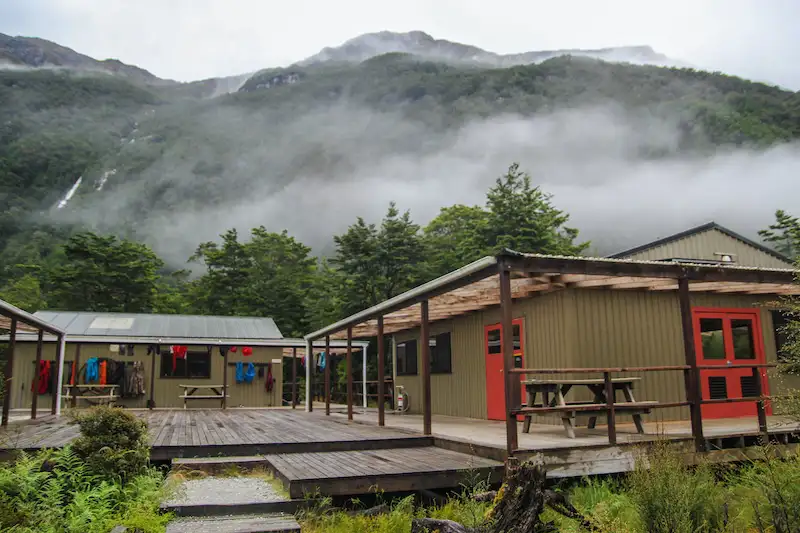
Want to know some of our hiking hacks?
STAY SAFE OUT THERE
Although we may have provided your hiking supplies, you’re responsible for ensuring you take appropriate clothing, food, and gear. A helpful checklist of what to take is included above (see your packing list), so please review it and ensure you and your group are fully prepared for all conditions and circumstances.
Staying safe also means following the track markers, signposted tracks, and looking out for one another.
The New Zealand Mountain Safety Council has loads of fantastic resources to help educate you further on staying safe in the great outdoors.
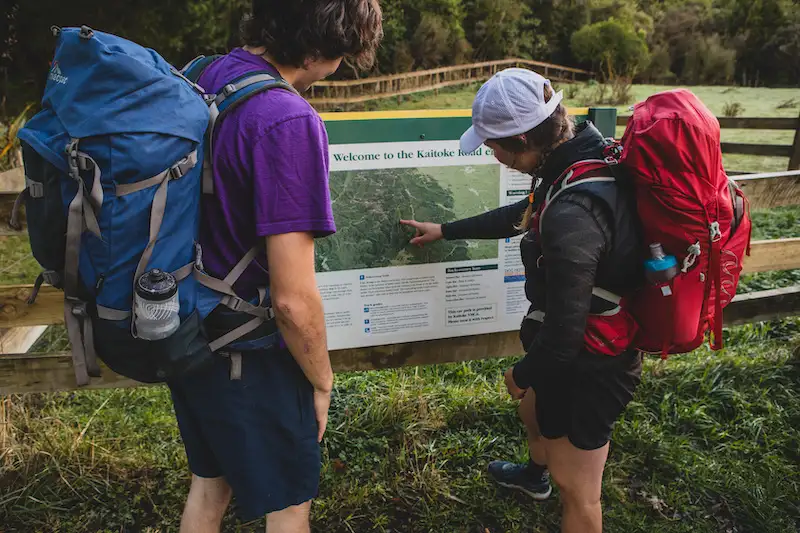
Photo credit Caleb Smith
RESOURCES TO KEEP IN YOUR POCKET
PLAN MY WALK
This easy-to-use app, brought to you by the New Zealand Mountain Safety Council, includes more than 1000+ NZ tracks, weather warnings, watches, and forecasts, track-specific alerts, interactive gear lists, and other useful planning advice such as track reviews from other users.
You can create a trip plan, add group members, assign an emergency contact, and share your plan with others. It’s planning made easy. Download the app or check out planmywalk.nz.
GREAT HIKES APP
Your personal Great Walk guide. This is a handy app to download and reference. It works offline and includes maps, videos, track section descriptions with GPS. It’s free to download.
